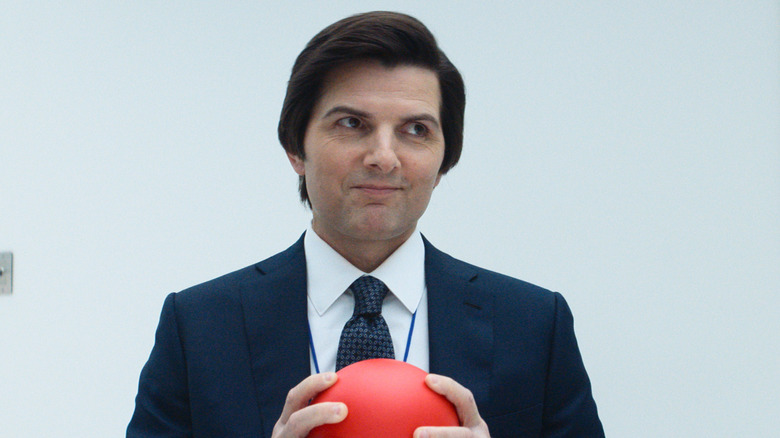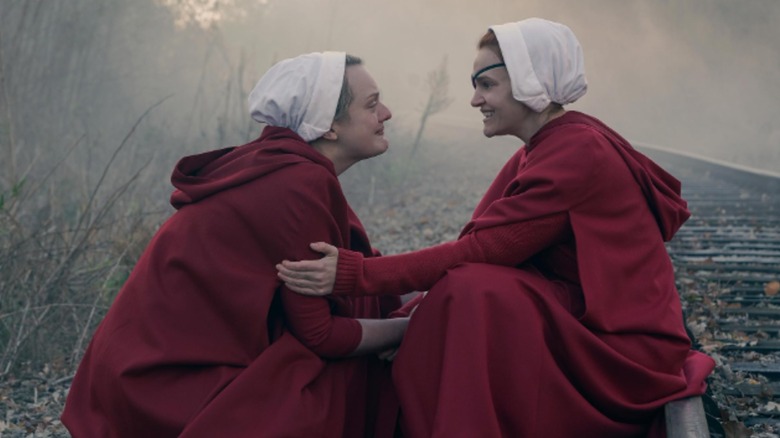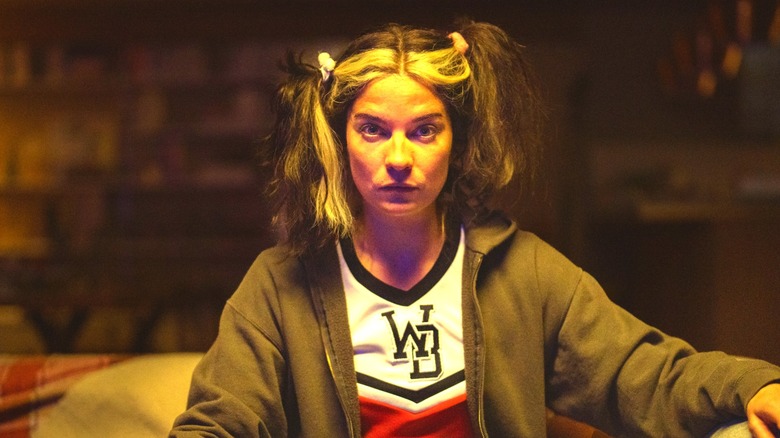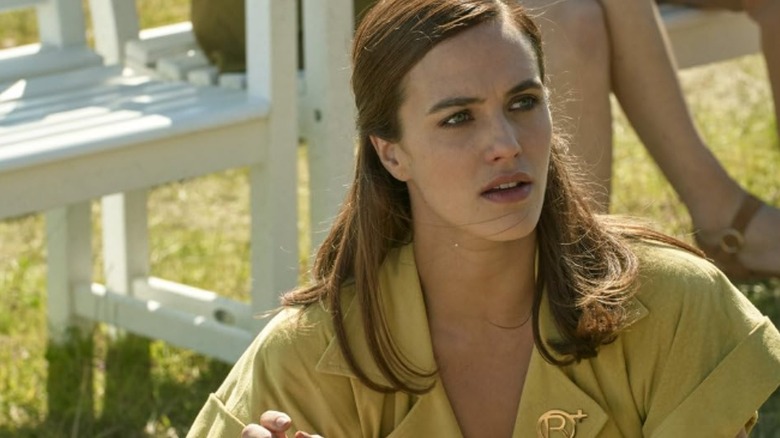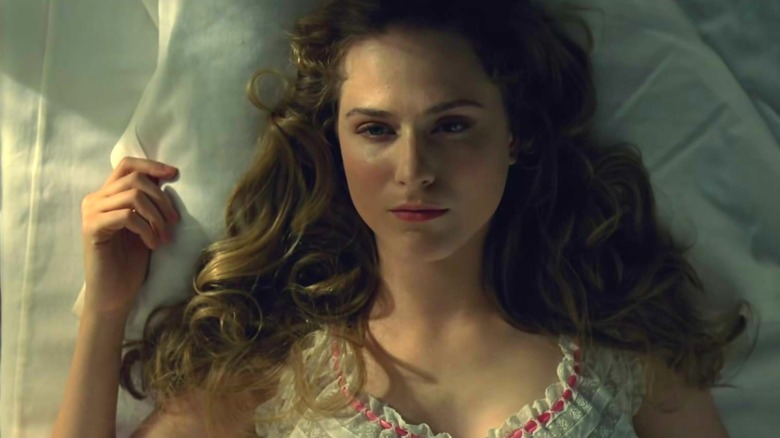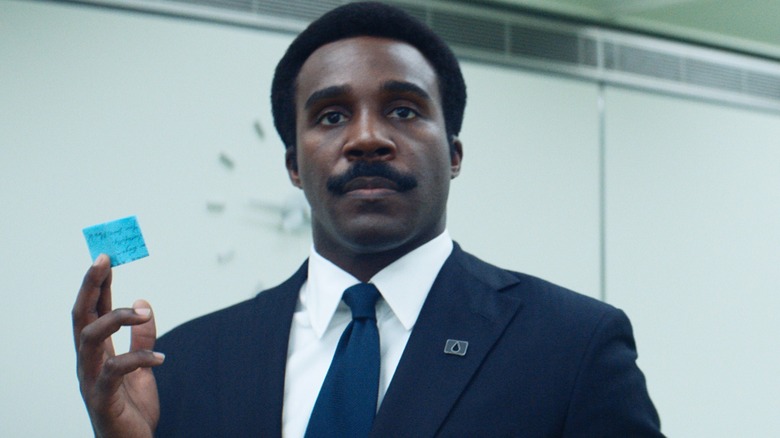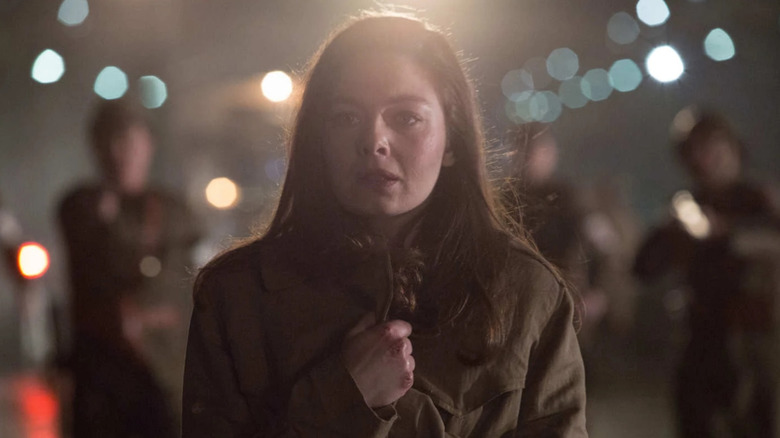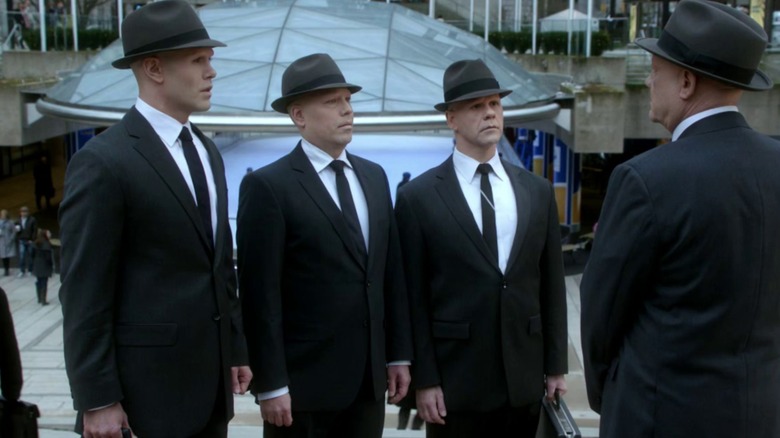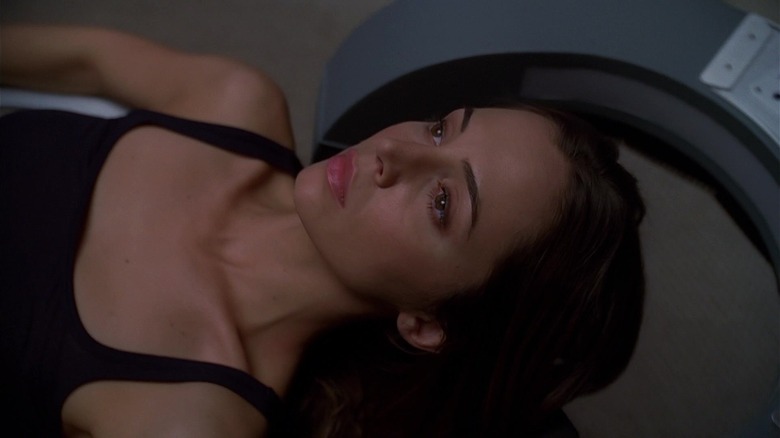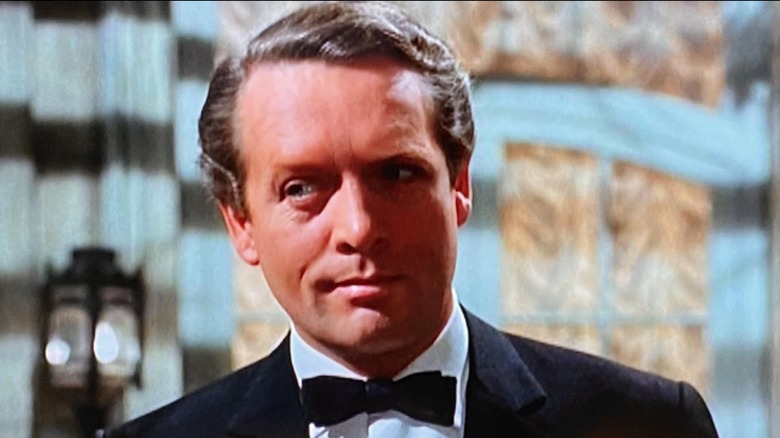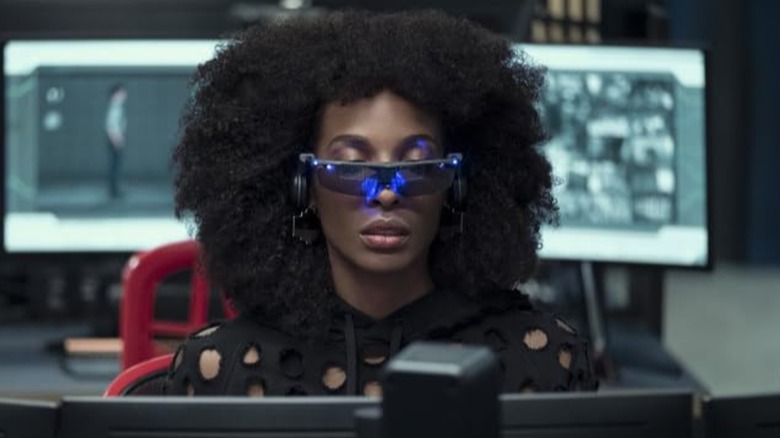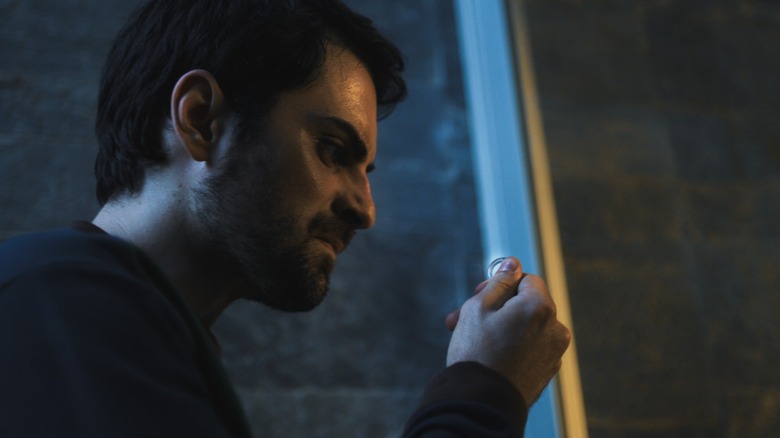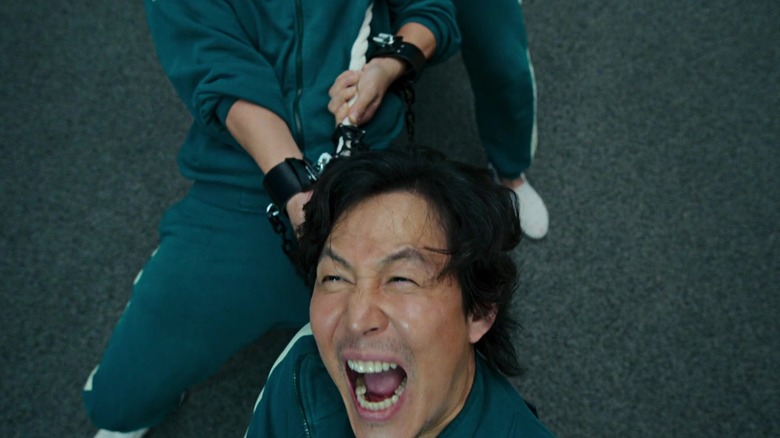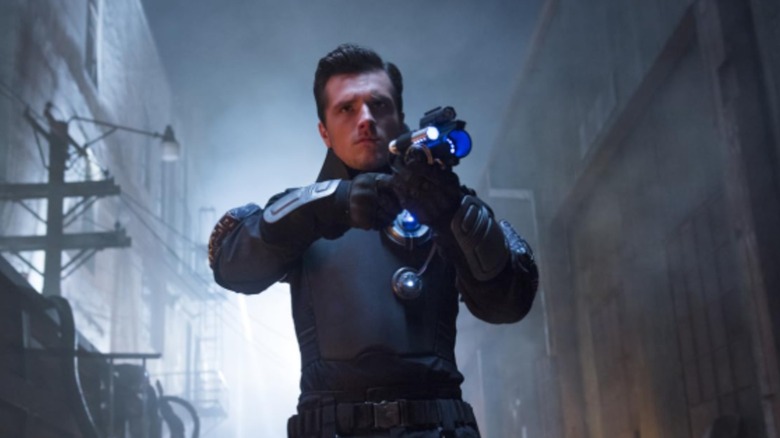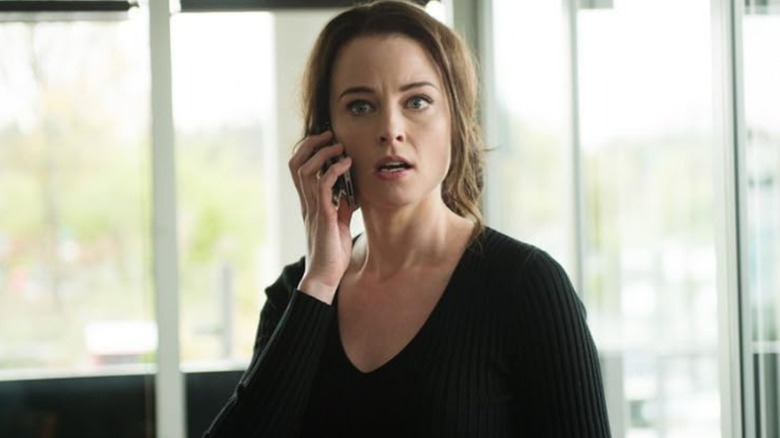14 Best Dystopian TV Shows You Need To Binge Next
Speculative fiction is one of humanity's oldest genres of literature, existing since at least the 5th century BCE when Plato dreamed up his ideal society, the philosopher-king-ruled city-state of Kallipolis. In Kallipolis, everyone would get a free, high-quality education, all people were equal regardless of gender, and things like justice and happiness would be society's highest values. To keep everything running smoothly, they would just need to abolish families, stratify society, heavily tax the working classes, and control every little aspect of individuals' lives.
Fast-forward to the Industrial Age, and the idea that one person's utopia would be a nightmare to many would become a full-fledged literary genre of its own, serving as a way to explore and criticize sociopolitical trends or as warnings against eschatological threats. And in today's landscape of fast-evolving technology and politically uncertain times, dystopian television can distill complex societal problems down to a more comprehensible format, while somehow paradoxically offering escapism from the real-world troubles all around us through its rich world-building.
From binge-worthy techno-dystopian sci-fi dramas to totalitarian theocracies, the best dystopian TV provides a safe way to explore sociopolitical worst-case scenarios. If nothing else, at least they've got it worse than we do.
The Handmaid's Tale
A fan of dystopian writers like Ray Bradbury and George Orwell when she was a teen, Canadian author Margaret Atwood set out to imagine a dystopian society from a woman's perspective in her 1985 novel "The Handmaid's Tale." The book imagines a near-future in which the United States government has been overthrown in a violent coup and replaced by the theocratic, totalitarian Republic of Gilead amid declining birth rates and increasing ecological disasters. In Gilead's tightly-controlled society, women are not permitted to read or own property. Fertile women found guilty under Gilead's interpretation of Biblical law are forced to bear children for the privileged through sexual enslavement.
While many considered the 1990 film adaptation of "The Handmaid's Tale" a weak adaptation, Hulu's 2017 series has earned broad critical and audience acclaim — not to mention 15 Emmys. Like the novel, the series is told mostly from the point of view of its handmaid protagonist June (Elisabeth Moss), renamed Offred to signify that she is owned by Commander Fred Waterford (Joseph Fiennes). Torn from her family while attempting to escape, June finds herself struggling to navigate a world where children are ripped from their mothers' arms.
Set to Adam Taylor's emotional score, "The Handmaid's Tale" continues the timeline far beyond the book's ending. The well-acted series is presented in an artful, cinematic style that makes good use of drone cameras and the subdued, almost Instagrammable color palette that serves as a backdrop for the handmaids' vibrant red cloaks.
Black Mirror
"Black Mirror" is an anthology series that uses science fiction and speculative fiction to examine human nature and the world we live in, often through the lens of technology in a near-future version of our current reality. Writing in The Guardian, creator Charlie Brooker explained, "The 'black mirror' of the title is the one you'll find on every wall, on every desk, in the palm of every hand: the cold, shiny screen of a TV, a monitor, a smartphone."
The stories of "Black Mirror" are all set in one shared reality, and although strands of certain tech can recur in multiple episodes, each story within the anthology can be viewed on its own. Each episode is distinctly different. A few feel like they could take place today, while others seem set in a more distant future.
Central to almost every episode is some aspect of technology. In "Nosedive," it's the social credit app that causes Lacie's (Bryce Dallas Howard) tightly controlled facade to completely melt down — an app that mirrors a real social rating system adopted by China in 2014. In "Loch Henry," it's the convergence of a true crime documentary-obsessed culture with a VHS tape collection that hides dark secrets within a bucolic Scottish community. Other episodes that deal with the implications of ocular blocking technology and digital copies of human minds mirror issues that feel familiar today, suggesting perhaps that we're in this dystopia already.
Brave New World
Peacock's "Brave New World" is adapted from Aldous Huxley's 1932 dystopian novel, which was written as a parodic response to sci-fi writer H.G. Wells' utopian "Men Like Gods" and "A Modern Utopia." Set hundreds of years in the future in the mid-26th century BCE, "Brave New World" imagines a future where all infants are born via artificial womb into a strict labor and intelligence-based caste system where they spend their lives chemically placated as part of the World State's efforts to maintain a copacetic society. When a man born outside the system comes into the fold, exposure to his influence causes everything to fall apart.
Using Huxley's ideas more as a rough outline, the Peacock series presents a technologically sleek future that, unlike many dystopias these days, feels pretty far removed from our reality. Like the novel, the series revolves around the experiences of hatchery technician Lenina Crowne (Jessica Brown Findlay), Bernard Marx (Harry Lloyd), and John the Savage (Alden Ehrenreich) as their lives intersect.
In terms of a well-developed philosophical exploration of today's sociopolitical issues, this adaptation of "Brave New World" doesn't have much to offer beyond its surface critique of escapism. But the central cast and world-building — not to mention a chance to see Huxley's vision come to life — make it a worthwhile watch.
Westworld
The premise behind the 1973 sci-fi Western film "Westworld" was always ambitious, with its story about lifelike androids in a grown-up amusement park that unexpectedly start turning on guests. Jonathan Nolan and Lisa Joy's 2016 HBO adaptation took the idea and ran with it, building out the world into an epic meditation on cruelty, affluence, free will, and the nature of consciousness and reality.
Told mostly through the disjointed POV narrative of synthetic "Host" Dolores Abernathy (Evan Rachel Wood), Season 1 introduces the world of Westworld through multiple timelines. Inside the expansive RPG-style adult theme park, guests can act out all of their darkest fantasies free of repercussions, knowing the synths will eventually be repaired and reset to repeat their storylines. Along with the other Hosts, Dolores' memories begin to break through as the coding deployed by their creator, Dr. Robert Ford (Anthony Hopkins), causes an evolutionary breakthrough, transforming them into sentient beings and inspiring a massacre against the park's human contingent.
The storytelling is enhanced by stunning backdrops stitched together from otherworldly locales like Moab's Canyonlands and California's Red Rock Canyon, along with an eerie, melancholic score from Ramin Djawadi.
Severance
The Apple TV+ series that people can't stop talking about, "Severance" blew critics away with its first season. Take John Doyle of Globe and Mail, who called the series "perfect paranoid drama about the workplace," and a drama "at once minimalist and epic, an increasingly tense exploration of free will and corporate sadism."
In "Severance," individuals can choose to implant a chip that "severs" their workday mind ("Innie") from the self that exists outside the office ("Outie"). Severed workers go into the office but leave with no recollection of their work life. For Innies, the opposite is true — effectively making Innies slaves who never get a day off work and have no private lives or families. The series is told through the eyes of Mark Scout (Adam Scott), whose Innie is fairly upbeat and agreeable while his Outie remains brooding and depressed from the recent loss of his wife. When new teammate Helly Riggs (Britt Lower) joins Mark's team, her questions and discontent disrupt the status quo, ultimately calling the whole system into question.
Subtle comedy and surreal details — like the mysterious roomful of baby goats in a corporate office or the bizarre numbers the workers must "refine" based on gut feelings — are part of what makes this series so addictive. A wholesome if forbidden workplace romance between Irv (John Turturro) and Burt (Christopher Walken), plus excellent chemistry between the four officemates, help soften the delivery of the show's indictment of corporate dehumanization of workers.
The Man in the High Castle
Adapted from the Philip K. Dick novel of the same name, "The Man in the High Castle" imagines a parallel universe containing an alternate history in which the Allied powers lost World War II. It's a butterfly effect extending from 1933, when Giuseppe Zangara's attempted assassination of President Franklin D. Roosevelt is successful. In this world, it's the Germans who drop the atomic bomb — right on Washington, D.C.
What once was the United States has been carved up by the Axis powers, with the west side of the country renamed the Japanese Pacific States. Unlike today's Japan of high-tech toilets and manga, this Japan resembles the empirical Shōwa period that never modernized in the wake of World War II. The east side of the country lies under the rule of the immensely powerful Greater Nazi Reich.
The story follows Juliana Crain (Alexa Davalos) as she learns about the other reality and becomes involved with a rebellion. The series, which won two Emmys, including one for cinematography, offers a thoughtful reminder that we may have come closer to living under oppression than most Americans realize.
Fringe
If you don't know what you're getting into, "Fringe" can at first seem like a weirder take on "The X-Files." And while the J.J. Abrams series does have a healthy heaping of lore like the Mulder-Scully series, the reason everything in "Fringe" is haywire boils down to a couple of psychedelic-fueled scientists. After a pair of Harvard science nerds decide science ethics are merely suggestions, they accidentally stumble across a parallel universe where technology is progressing at a slightly different rate than our own. Later on in the series, they learn about an even darker future on the horizon.
"Fringe" is a show about what-ifs — specifically, what if the wrong people are given unleavened access to power and technology. The entire series tells a complete story, tying in even the episodes that don't seem to connect. The darker warning underlining the series is tempered with humor through the snack-loving, LSD-dosing Walter Bishop (John Noble) and an emotional romance between two of the show's main characters. And the best part? It ends with a message of hope, optimism, and redemption.
Dollhouse
Thematically similar to "Westworld" and "Nikita," "Dollhouse" is Joss Whedon's series about a group of attractive young individuals called "actives" whose minds are repeatedly reprogrammed and wiped as they are ordered again and again by wealthy clients to do as they please with. Actives believe they've all volunteered for the gig in exchange for tremendous wealth at the end of their five-year contract, when they'll regain their original personalities and biographical memories ostensibly stored somewhere on a hard drive. With each new gig, they are imprinted with a new identity depending on that client's order. In between gigs, their minds should be a clean slate — and they are, until actives' past memories start to bleed through.
The series follows Echo (Eliza Dushku), an active who gradually begins to wake up to the organization's nefarious intentions. As the series progresses, the extent of those intentions and their broader implications are also revealed. An examination of free will, identity, and the corporate capacity for cruelty, the series is action-packed and entertaining, with a cast that includes a handful of favorite sci-fi actors like Alan Tudyk, Jamie Bamber, Tahmoh Penikett of "Battlestar Galactica," and Dichen Lachman from "Severance."
The Prisoner
"The Prisoner" is the type of hidden gem series that's just begging for a 2020s revival (forget the thoroughly rotten 2009 limited series). The 1967 original follows a British secret intelligence agent (Patrick McGoohan) whose attempt at rage-quitting his gig gets him gassed, abducted, and rehomed in a mysterious place called "The Village," where no one remembers how they got there or for that matter, who they are at all.
Although beautiful and outwardly made up like a seaside resort where all of its residents' needs are met, the Village proves inescapable and disconnected from the outside world. And for all its beauty, the Village is a police state where residents are under surveillance at all times. Rather than names, Village prisoners are designated numbers — the protagonist is Number Six. Most of the series focuses on Six's attempts to escape, undermine Village overseers, or learn the truth of where they are and his own identity.
Vibrant and strange, "The Prisoner" is one of the best sci-fi shows of its era and more than stands up today. The paradox of the Village's beauty contrasted against the panopticon-level surveillance is an unsettling metaphor that bears reviewing in today's hyperdigital world.
Upload
"Upload" is a lighthearted comedy-drama powered by a wonderfully deep dystopian story that mirrors the "Black Mirror" episode "San Junipero." Set in the 2030s, "Upload" imagines a near-future where one's final plans include choosing a digital afterlife to spend eternity in. When computer programmer Nathan Brown (Robbie Amell) becomes seriously injured in a self-driving car accident, his girlfriend convinces him to upload to the afterlife community Lakeview.
Once there, he quickly realizes what a drag spending eternity trapped in a middling resort while beholden to his controlling still-living girlfriend's bank account can be. Just as he's about to tap out, he starts to develop feelings for his "angel" Nora (Andy Allo), a living customer service and tech support agent who logs on virtually to help him.
In between the show's central romance and gags about internet culture and online behavior, "Upload" presents a bleak look at the corporate pressures and classism that rule the real world powering Lakeview. It also does a fair job of examining how digital technology commodifies our humanity in a way that feels a little too close to home.
3%
Netflix is full of quality shows not filmed in English, and "3%" is one of the best of the bunch. A Brazilian production, the Portuguese-language series exists in a world where extreme poverty is a fact of life for everyone living in a sector known as the Inland. The have-nots of the Inland, who make up 97% of society, covet life on the Offshore, an idyllic island where the remaining 3% live in much-fabled luxury, presumably on the backs of the poor.
But that's not to say the good life isn't attainable. At the tender age of 20, every Inlander gets one shot in a lifetime to try to get in, through a rigorous set of challenges known as "the process." With most eliminated either through failure or death, the remaining 3% graduate to the Offshore.
Best viewed in subtitles, the series examines the desperation and ruthlessness that even good people can experience when competing for limited resources in a socially stratified society. This message is particularly potent when considering that the conditions in some of Rio de Janiero's favelas aren't that far off from the Inland.
Squid Game
Thematically similar to "3%," with a focus on the type of exploitation that's central to South Korean black comedy "Parasite," "Squid Game" envisions a secret deadly competition run by the super-wealthy that targets the destitute and heavily indebted. The 456 contestants who enter the invitation-only event sleep in a dormitory while participating in high-stakes versions of classic children's games — like "Red Light, Green Light," except anyone who moves on the red light is gunned down. But it's hardly a deterrent since with each death, the jackpot they're all vying for grows.
Much like "Parasite," "Squid Game" was inspired by the ever-growing income inequality divide of a nation where South Korea's 82 uber-wealthy chaebol families live like royalty while most of the country lives in relative poverty. In a Variety interview, creator Hwang Dong-hyuk explained, "I wanted to write a story that was an allegory or fable about modern capitalist society, something that depicts an extreme competition, somewhat like the extreme competition of life. But I wanted it to use the kind of characters we've all met in real life." According to Hwang, the series is also heavily influenced by Japanese manga and anime.
Future Man
A Seth Rogen comedy with a surprising amount of substance, "Future Man" follows a shiftless medical lab janitor named Josh Futterman (Josh Hutcherson) whose gaming fantasies quite literally come to life when two characters from his favorite game, "Biotic Wars," appear in his room to recruit him for a time-travel adventure. Unaware that video games are not training programs, Tiger (Eliza Coupe) and Wolf (Derek Wilson) reveal they're from a future where lab-engineered humans called Biotics oppress those who are born naturally — and all of it can be traced back to Josh's workplace.
Like the SyFy series "12 Monkeys," another one of the best sci-fi shows you're still not watching, "Future Man" turns what's meant to be a one-and-done time travel gig into a seemingly unending chain of causality misadventures that cause more problems than they solve. Haley Joel Osment, Keith David, Ed Begley, Jr., Glenne Headly (in her final performance), and Awkwafina all add to the magic of this hilarious and heartfelt time travel dystopia series.
Continuum
Another time travel story with a much darker tone than "Future Man," "Continuum" begins in the cyberpunk Vancouver of 2077 — a world ruled by a Corporate Congress that uses harsh penalties and technology to surveil and control its people. City Protective Services officer Kiera Cameron (a post-"Criminal Minds" Rachel Nichols) buys into it all. But when a group of freedom fighters transport her to 2012 in their efforts to circumvent the death penalty and alter the future, Kiera finds herself trapped in an unfamiliar time.
In her efforts to stop them, Kiera crosses paths with a young version (Erik Knudsen) of the man (William B. Davis) who created that dark future, setting off a chain of events that disrupt her reality forever. Unlike many dystopian thrillers, "Continuum" presents a more nuanced look at the dark future it presents, a reminder that many everyday people don't realize they are caught up in systems of oppression.
